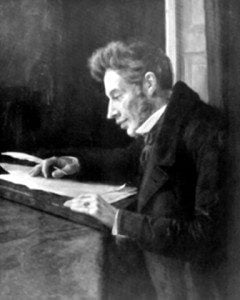The quotes below are taken from Kierkegaard’s extensive review of a novel, Two Ages, by the Danish author Thomasine Gyllembourg (though she published it anonymously). His review, published in 1846, was nearly as long as the novel itself. Kierkegaard offers not just a review of a book, but a lengthy and incisive cultural critique. In the section below, he identifies the situation of nineteenth-century Denmark as being devoid of passion (such as the passion of the previous Revolutionary age) and defined by its preoccupation with “reflection.” The consequence of replacing passion with reflection is a situation of “leveling,” one in which the individual is subsumed by the “crowd.” An abstraction called the “public” is created (the media contributes to the creation of this abstraction) and as a result, people see themselves not as concrete individuals motivated by important ideas and ideals, but as the proverbial cogs in the wheel. Quotes are all from the Princeton edition (1978), pp. 86-96.
Leveling is not the action of one individual but a reflection-game in the hand of an abstract power.
No period, no age, and therefore not the present one, either, can halt the skepticism of leveling, for the moment it wants to halt leveling, it will once again exemplify the law. It can be halted only if the individual, in individual separateness, gains the intrepidity of religiousness.
For leveling really to take place, a phantom must first be raised, the spirit of leveling, a monstrous abstraction, an all-encompassing something that is nothing, a mirage–and this phantom is the public. Only in a passionless but
reflective age can this phantom develop with the aid of the press, when the press itself becomes a phantom. There is no such thing as a public in spirited, passionate, tumultuous times.
…A sedentary reflective age devoid of passion will produce this phantom if the press is supposed to be the only thing which, though weak itself, maintains a kind of life in this somnolence. The public is the actual master of leveling, for when there is approximate leveling, something is doing the leveling, but the public is a monstrous nonentity.
The public is not a people, not a generation, not one’s age, not a congregation, not an associateion not some particular persons, for all these are what they are only by being concretions.
Together with the passionlessness and reflectiveness of the age, the abstraction “the press” (for a newspaper, a periodical, is not a political concretion and is an individual only in an abstract sense) gives rise to the abstraction’s phantom, “the public,” which is the real leveler.
But in proportion to the scarcity of ideas, an age exhausted by a flash of enthusiasm will relax all the more readily in indolence, and even if we were to imagine that the press would become weaker and weaker for lack of events and ideas to stir the age, leveling becomes all the more a decadent urge, a sensate stimulation that excites momentarily and only makes the evil worse, the rescue more difficult, and the probability of destruction greater.
photo credit: <a href=”http://www.flickr.com/photos/9783357@N08/12634716915″>Bloco Me Esquece 2014</a> via <a href=”http://photopin.com”>photopin</a> <a href=”https://creativecommons.org/licenses/by-nd/2.0/”>(license)</a>














